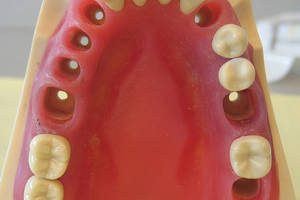Dental implants are known as a permanent solution to the problem of tooth loss. They are known to stay good for a decade or so after placement and are the only known method of tooth replacement that stops tooth loss as a condition from getting worse, and replaces every aspect of the tooth, both functionally and aesthetically. But is it really a permanent solution? How will the same dental implant look in twenty years, for example? What can go wrong over time? This article seeks to explain a little about the expected life of dental implants, how long they should last and how to care for them to get the most out of them.
What can go wrong?
Implantation
About 2% of dental implantations fail. This can be due to either the incompetence of the dentist, the failure of recognizing damaged or otherwise faulty tissues, the failure of the dental implant and the materials that were used in making it, and sometimes the body simply will not accept the dental implant. These are almost always successfully re-implanted. Sometimes an implantation that did not succeed completely is left in place. These should be spotted very early on, as if the dental implant moves, for example, then micro-fissures should form, and a badly placed dental implant will be loose soon enough.
Problems of the dental implant
Some dental implants can be faulty, and can break or have other kinds of problems. Dental implants come with manufacturers guarantees for this reason exactly, to make sure that all of these dental implants that may have some kind of problem with them and were made incorrectly get found out in time. Unfortunately, this may take 5-10 years before the fault causes dental implant failure, which is why manufacturer’s guarantees are so long.
Peri-implantitis
A dental implant is made of a very special titanium alloy that is much harder than the surrounding bones and soft tissues. In certain cases the dental implant can start to wear away the surrounding tissues, causing a condition known as peri-implantitis, or the inflammation of the tissues around the dental implant. This can occur for a number of reasons, faulty implantation, undiagnosed problems, a change in the medical condition of the patient, or a shift in the teeth are all reasons this can occur. This is quite rare and can be seen well before it becomes a real problem.
The most important thing is to make sure you keep your dental appointments if you have dental implants. Dental implants require constant maintenance and upkeep, and any problems that may occur can only be seen if you keep your six month check-ups. In certain cases, guarantees can be void if the patient does not show up, so you should definitely go to your appointments.
Our fees at London and Budapest
Claim your free consultation!
Special dental offer for those who decide to travel and would like to stay in Budapest!
The offer is valid until 31st of December, 2019.






